|
1.
CENTRAL/ WEST AFRICA
Firm prices buck trend of previous years
Prices were stable and demand remained firm in early December probably due to the rather tight supply situation
in the region which is keeping buyers attention firmly fixed on obtaining regular shipments from reliable
shippers. This is opposed to previous years when prices weakened from mid-November through December
due to the Christmas holiday in Europe. Now, the European influence is comparatively reduced while Asian
buyers remain very active amid much less prolific
supply. China and India are active log buyers. Although rains persist in some areas, the short dry season is
approaching with expectations of easier logging and transportation through December and January.
South Africans active buyers of merchantable grades
South Africa is a consistent and steady buyer of okoume lumber in merchantable grade, which produces a
much higher conversion rate than the usual European higher qualities. Some high grade lumber is being
purchased by Netherlands importers at top price while Italian buyers are losing out as their offer prices are less attractive.
Far East¡¯s interest in investment continues unabated
Far East companies continue to be very much interested in buying out or investing in medium to larger well
established producers in the region. It seems likely that some of the long term European owned business will change hands in the short to medium term.
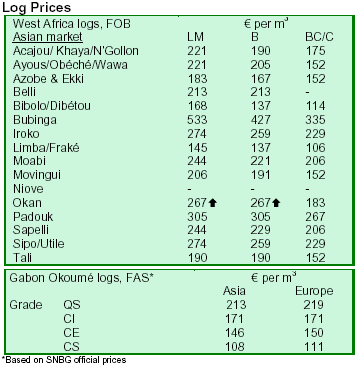
French group interested in processing facilities in Liberia
French timber company Groupe Rougier visited Liberia to explore investment opportunities in the forestry sector.
During the visit, Rougier¡¯s Chairman, Francis Rougier, met representatives of the government, the Forestry
Development Authority (FDA), the National Investment Commission, private institutions and NGOs involved in forestry activities.
The Groupe Rougier, which had a turnover of $195 million in 2005, has operations in Gabon, Cameroon and
Congo. Rougier has 83 years of timber investment experience and began operations in Africa in 1954. The
company operates a plywood factory in Gabon and sawmills in Gabon, Cameroon and Congo. Mr. Rougier
indicated that his group intended to establish similar processing facilities in Liberia once it gains the legal right
to operate in the country. Rougier is represented in Liberia by the local investment consultancy firm, Jafain Consortium, Inc.
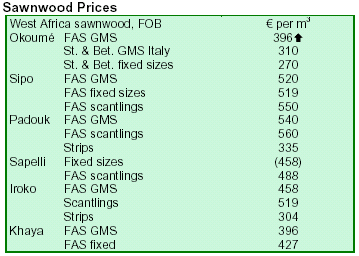
2. GHANA
Levy on timber exports to continue in 2007
The Minister of Finance, Baah Wiredu, read the nation's 2007 Budget Statement to the Parliament recently.
According to the Budget, the 3% duty on timber exports will continue. However, the Ministry of Lands, Forestry
and Mines together with industrial representatives will review the fiscal and financial framework of the Forestry
Commission, in particular, and of the forestry sector in
general in order to effect the necessary logistic amendments to address the concerns of
stakeholders. For sometime, there has been controversy regarding the Forestry
Commission's export levy on timber and its
alleged adverse impact on the fortunes of the timber industry (see TTM 11:18). The 2007 Budget was expected
to be approved by the Parliament before the end of the year.
Meanwhile, about 260 timber leases will be converted to Timber Utilization Contracts (TUCs) in 2007. As a fiscal
instrument, the conversions are expected to generate an additional 92 billion cedis ($10 million).
Validation of Legal Timber Project set for completion
Preparations for the Validation of Legal Timber Project (VLTP) and the competitive tendering for the procurement
of relevant equipments are advanced and were expected to be completed by year-end. The VLTP, which was initiated
in 2005, was expected to be pilot tested by the end of the year. VLTP will essentially enforce the regulated harvest
limit, contribute to securing forest revenues and assist the government to meet its commitments under the planned
Voluntary Partnership Agreement (VPA) with the EU. The VPA is an EU initiative which seeks to deter illegal timber entering the EU market.
Forest plantation programme yields results
The National Forest Plantation Development Programme launched in 2001 by President Kufuor has established
81,000 ha of plantations. The programme has also contributed to employment generation, employing about
46,058 people full time and one million more part time.
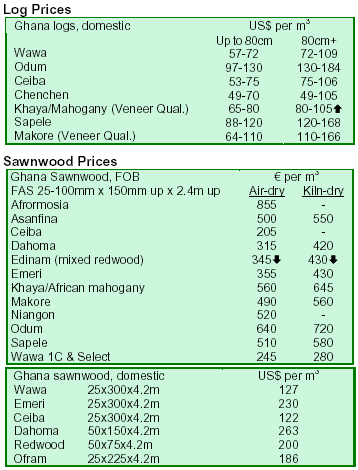
3.
MALAYSIA
Prices largely unchanged ahead of Christmas holiday
Thunderstorms continued to hit most parts of Malaysia. However, business activities were slowing down ahead of
the Christmas and New Year holiday season in export markets, particularly in the USA and Europe. Prices for
most timber products were unchanged, with some moderate price movements for logs and panels, giving
market players some breathing space. Prices for furniture
products have reached a standstill due largely to a rather quiet US market. Demand for plywood and other panel
products remained strong and is expected to stay firm through 2007.
Rising log prices in Sarawak have troubled some local downstream manufacturers and processors as Japanese and
other Far Eastern buyers are often more prepared to pay higher prices. However, this may change as the US dollar continues to weaken against the Malaysian
ringgit.
FPDSB grants soft loans for rubber tree plantations
Forest Plantation Development Sdn. Bhd. (FPDSB), a unit of the Malaysian Timber Industry Board (MTIB), has
signed soft loan agreements with five privates companies for forest plantation programmes. The companies are
Upayapadu Plantation Sdn. Bhd., Acacia Industries (Kelantan) Sdn. Bhd., Anjakan Wawasan Sdn.
Bhd., Mieco Wood Products Sdn. Bhd. and Tropical Position
Sdn. Bhd. The total loan amount of 70.7 million ringgit (around $20 million) will be used for planting rubber trees
on a total area of 13,200 ha in the States of Pahang, Kelantan and Selangor next year. FPDSB has approved
loans worth 80.3 million ringgit up to now for various reforestation
programmes.
Malaysia urges more financial support for plantations
Malaysian Plantation Industries and Commodities Minister, Datuk Peter Chin, indicated that the Malaysian
timber industry would continue to grow, if it received more support from the financial institutions. His statement
was made at the inaugural Malaysian Forest Dialogue themed ¡ˇăChallenges and Opportunities in Financing
Sustainable Forestry and Timber Trade¡ˇŔ in Kuala Lumpur.
The minister added that the development of forest plantations would help to reduce the dependency of Malaysian timber companies on natural forests as the
primary source of raw material. The dialogue was organized by the HSBC Bank Malaysia, in collaboration
with the Malaysian Timber Council, Business Council for Sustainable Development Malaysia, Malaysian Timber
Certification Council, WWF Malaysia and the Malaysian Nature Society.
TTF, NTTA and MTC hold trade forums in Malaysia
The UK Timber Trade Federation (TTF), Dutch Timber Trade Association (NTTA) and Malaysian Timber Council
have joined forces to implement a programme of market research and trade forums to communicate changes in
requirements for legal and sustainable timber. Asian exporters face many challenges meeting international
market requirements, but new EU legislation and public
and private sector purchasing policies are now combining to require legal and sustainable timber. With funds from
the UK Department for International Development (DFID), TTF, NTTA and MTC have commissioned a
series of reports on international and European markets by market specialists, and will be organising a series of Trade
Forums in Kuala Lumpur, Kuching and Kota Kinabalu on
15-20 January 2007.
The Forums will consist of one-day of formal presentations and discussions of the changing markets and
how to meet their requirements and business-to-business networking opportunities.
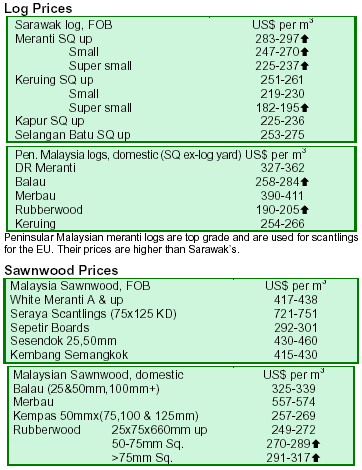
4.
INDONESIA
Governor suspended for palm oil plantation permit fraud
East Kalimantan Governor, Suwarna Abdul Fatah, faces life in jail after prosecutors accused him of a multi-million
dollar corruption fraud linked to palm oil plantation permits. He is accused of four counts of abuse of power
related to a million hectare palm oil plantation in Berau district, along the Indonesia-Malaysia border. The
prosecutor said that the governor had, between 1999 and 2002, issued a permit for the new palm oil plantation.
The company which obtained the permit, an alliance of 11 firms, cleared the land, made use of the wood from the
felled forest but never built the palm oil plantation. He is accused of having caused losses to the state totalling 348
billion rupiah (38.2 million dollars). Mr. Suwarna alleged that the charges against him were politically motivated and
groundless.
Indonesian labour rules take toll on Investment
Analysts say that Indonesia's labour law and high severance costs are major deterrents to foreign investors.
According to the analysts, Indonesia's 2003 labour law is discouraging new investment and it may be costing
Southeast Asia's largest economy a chance to lure foreign manufacturers looking for alternative production sites to
China, where wage costs are on the rise. Instead, manufacturers seem to be opting for Vietnam, where
wages are lower and productivity is high. The labour law requires that dismissed workers in all industries, both
foreign and locally owned, receive up to several years in severance pay (average 108 weeks, according to the World
Bank) and even employees who quit are entitled to payouts. Factories wanting to downsize may find to costly
to lay off employees and rather declare bankruptcy. The cost of severance benefits would have bankrupted them
anyway, according to some manufacturers. The law also allows local governments to set minimum wage increases
for private-sector workers, rather than letting employers link the annual raises to productivity.
A labour bill that would have cut severance pay and made it easier to hire contract workers was withdrawn early this
year after hundreds of thousands of workers took to the streets in protest. Official unemployment is currently
running at 10% of a work force of 120 million, up from 8% in 2000. However, some foreign manufacturers say
Indonesian workers tend to stay in their positions longer than in Vietnam and China, making it easier to keep
skilled staff.
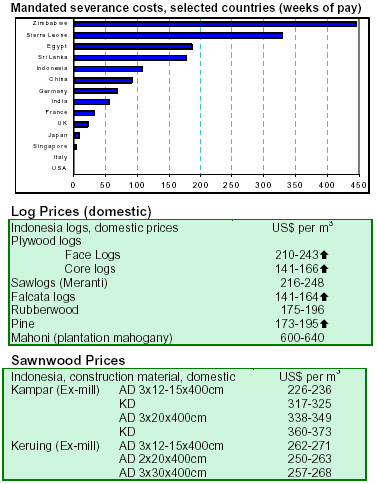
5.
MYANMAR
Low stocks hamper local teak processing
The export market for sawn teak and other secondary processed wood products remained weak. Although orders
for specialised sizes still came in, there was a low inventory of logs at mills and factories. Private producers
face difficulties meeting the orders with the existing log situation, thus adversely affecting the market. The same
situation was reported in Myanma Timber Enterprise
sawmills. The short inventory at sawmills is probably due to the high prices being paid for logs in MTE tenders and
direct sales. Foreigner buyers are better prepared to outbid locals for teak log volumes.
High prices slowing sales of pyinkadoe logs
Sales of pyinkadoe logs continued to be sluggish. Buyers said that this is due to the high prices in MTE direct sales.
Logs from last year's production are reported to remain unsold in Yangon log depots. The current
year's extraction
will come in soon and might make last year's unsold logs
less attractive. In contrast, the market for gurjan (keruing) logs was reported as good. Previously unsold stocks have
been cleared and sales are predicted to remain active as buyers await this
year's new production which will be trucked down to Yangon in January.
Myanmar to establish special economic zones
Myanmar announced that it would soon enact a special economic zone (SEZ) law, aiming to lure more foreign
investment to promote economic development. Special privileges are expected to be offered to foreign investors to
set up SEZ. The exceptional Thilawa in Yangon's Thanlyin township, southern Myanmar, is expected to be
the first SEZ. Meanwhile, the establishment of three other
special industrial zones proposed by Thailand is also underway. Myanmar is also likely to establish one more
special industrial zone in Rakhine state and invite foreign investment mainly from Bangladesh for the development.
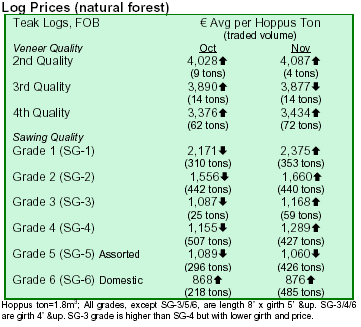

6. PAPUA
NEW GUINEA
PNG log exports soar in October
Log exports from PNG rose to 270,161 m3 in October 2006, up 31% from September and 21% from October
2005. Accumulated log exports in the year to September were 13% ahead of the pace last year (see chart).
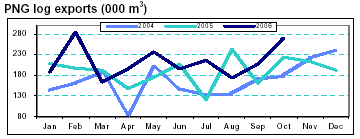
Total log exports (excluding plantation) amounted to 2.53
million m3 in the period from November 2005 to October 2006. Saw/veneer grades accounted for 87% of the total.
Main log export species were taun, malas, bintangor and terminalia. China took 82% of all log exports, followed by
Japan (8%), Vietnam (3.4%) and Korea (3.4%). Of the saw/veneer log grades, China imported 88.7%, Japan
5.6%, Korea 2.4% and India 1.6%. For plantation species, kamarere remained the main export species primarily to
the markets of Vietnam, Japan, China and Korea.
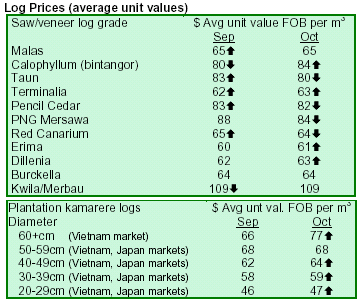
7. BRAZIL
Roraima's solid-wood sector ends year in crisis
The solid-wood production in the Northern Brazilian State of Roraima has steadily declined during 2006. The
Roraima Lumber Union (RLU) said that 2006 brought additional losses to the sector in this and other regions of
the country. RLU indicated that the state's solid-wood sector used to create 1,200 direct jobs and at least 6,000
indirect jobs. Late this year, that had been reduced to
around 300 direct employees while at least two large companies had already shut down.
Problems in the region's solid-wood sector date back to 2003, when bottlenecks in wood harvesting from natural forests begun, according to RLU. Over the period,
IBAMA's regional board was replaced and a new normative instruction modified the procedures to license
timber at the harvesting site. In 2006, the wood harvesting licensing process went under the responsibility of the State
Foundation of Environment, Science and Technology (FEMACT) and, since October, the license was replaced
by the Forest Origin Document (DOF). Other setbacks, according to RLU, included the steady depreciation of the
US dollar that led to a 60% drop in revenues compared
with 2005 and rising production costs (fuel, electric energy, wages and taxes) that jumped nearly 50%.
Regional producers argued that due to the combination of these factors, they have failed to benefit from the strong
demand for solid-wood products.
Wood sector pins hopes on forest concession law
Concerns over raw material supply for the solid-wood sector and the current forest management policy were the
main topics discussed during the Tropical Wood Supply, Industrialisation and Trade Seminar held in November at
the Parˇ§¢ Industry Federation (FIEPA), in Northern Brazil. According to the National Wood Flooring Producers
Association (ANPM), the problems faced by the sector
range from excess of bureaucracy to loss of institutional image. The Wood Exporting Industries Association of
State of Parˇ§¢ (AIMEX) said that difficulties to approve forest management plans in recent years were caused by
regional land and agrarian issues.
The sector has high expectations for the implementation of Law 11,284/06, also known as Law of Public Forest
Management, whose regulation is in its final phase. Under the law, timber from public forests is expected to be sold
under a bidding process from next year on and some forest concessions would be available. The law establishes that
the winning company shall submit a forest management plan to the environmental agency to obtain a 40-year
contract.
Added protected areas create massive Amazon mosaic
The governor of Parain northern Brazil recently announced a new law creating seven new protected areas
totalling 16.4 million ha, an area larger than England. Under the new law, 59% of the state and 42% of the
Brazilian Amazon are now protected. Two of these areas, the Grao-Para
Ecological Station (4.3 million ha) and the Maicuru Biological Reserve (1.2 million ha), are to be
strictly protected areas. Conservation International estimated these two areas alone may host over 50% of the
animal and plant species found in the Amazon region. The connectedness of the areas, plus areas previously
designated as protected, results in a "biodiversity conservation
corridor"giving species vast roaming range. The protected areas also sit on the Guayana Shield, which
contains considerable freshwater reserves, a boon to locals now assured of a healthy water supply.
Additionally, the grand-scale conservation efforts will undoubtedly contribute to carbon storage and reduced emissions from
deforestation.
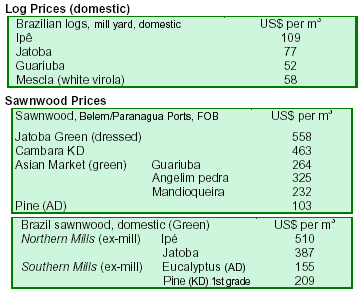
8. PERU
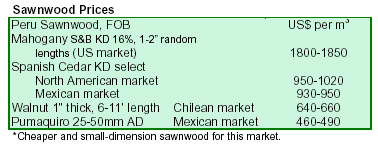
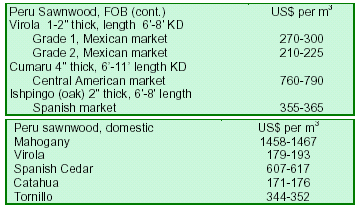
9. BOLIVIA
Santa
Cruz's export value rises despite lower volume
Santa Cruz's wood product exports rose 9% to $39.7 million in Jan-Nov 2006, the fourth consecutive annual
growth. However, this was lower than the 33% annual growth registered between 2002 and 2005. This was due to
declines in export volumes of sawnwood (down 8%) and
added value products (down 13%). Prices increases, mainly for sawnwood, offset the declining export volumes and drove the export value up in the period.

10. Guatemala
Guatemalan exports expand steadily in recent years
Guatemala's exports of forest products increased 61.3 % from $39.8 million in 2002 to $64.2 million in Jan-Nov
2006. The main export products supporting this growth were sawnwood,
deckings, doors, plywood, floor, impregnated wood and veneer. Furniture increased its
share in exports, rising from $10 million in 2002 to $15 million in Jan-Nov 2006.

11.
Guyana
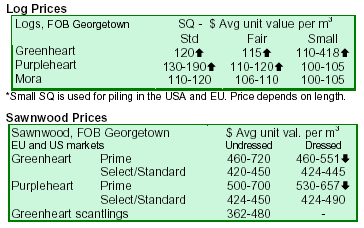
|